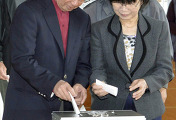일본의 아베 신조 정부가 비밀보호법을 통과시켰다. 그러면서 정부가 하는 일에 대해 전체 사실을 얘기하지 않겠다는 뜻을 세상에 발표했다. 전체 사실을 얘기하지 않는 것은 거짓말의 한 형태이기 때문에 일본 정부는 거짓말할 의도를 공공연히 밝힌 거라고 볼 수 있다.
한나 아렌트가 1971년 <정치에서의 거짓말>이라는 에세이에서 지적했듯이 “정치적 목적을 달성하기 위해 비밀, 속임수, 고의적 허위, 명백한 거짓말을 합법적 수단으로 사용하는 것은 유사 이래 늘 있어왔다”. 물론 정부는 거짓말을 한다. 하지만 어떤 정부가 이번에 일본 정부가 했듯이(비록 무심코 그랬다 하더라도) 거짓말을 정책의 중심에 놓는 경우는 드물다.
아렌트는 미국 역사상 최대의 내부고발 행위 중 하나인, 대니얼 엘스버그가 펜타곤페이퍼를 뉴욕타임스에 넘겨준 사건에 기초해 이 에세이를 썼다. 47권으로 이뤄진 펜타곤페이퍼에는 미국 정부가 베트남전을 어떻게 시작해 점점 확대해나갔는지에 대한 ‘비밀’이 담겨 있다. 아렌트가 말했듯이 이 문건의 첫 번째 충격은 “거짓말하는 정책은 적을 대상으로 하는 경우는 거의 없고, 주로 국내 청중에 대한 선전 목적, 특히 의회를 속이기 위한 목적으로 만들어진다”는 점이다. 이것은 통킹만 사건에서 분명히 드러났다. 미국 정부는 북베트남 순찰선이 미국 군함을 두 차례 공격했다고 주장했다.

미국은 이것을 북베트남에 대한 폭격 개시에 이은 전쟁 확대를 정당화하는 데 활용했다. 하지만 진실은, 첫 번째 사건은 미국 군함이 먼저 발포했고, 두 번째 사건은 일어나지도 않았다는 것이다. 북베트남 정부는 진실을 알고 있었다. 하지만 미국 의회와 대중은 속아 넘어갔다. 더욱 놀라운 점은 정부와 군 당국자들이 자신의 거짓말을 어떻게 해서 진심으로 또는 마지못해 진실로 믿게 되느냐에 있다. 정부의 공식적 거짓말이 갖는 문제는 그 거짓말이 정책의 기초가 된다는 점이다. 아렌트는 그 예로 미국 정부가 북베트남을 폭격함으로써 남베트남에서 일어나는 소요사태에 대한 북베트남의 지원을 중단하게 할 수 있고, 그러면 전쟁을 빨리 끝낼 수 있다는 논리를 대중에게 설파한 것을 들었다. 펜타곤페이퍼를 보면 중앙정보국(CIA) 정보원들은 그 이전에 정부에 그런 일은 일어나지 않을 것이라고 보고했다. 하지만 정부는 스스로의 거짓말에 얽매여 정책을 계속 밀고나갔고, 미국은 결국 굴욕스럽게 퇴각했다.
우리는 자연스럽게 이런 궁금증을 갖게 된다. 아베 정부가 그렇게 숨기고 싶은 사실은 무엇일까. 당장 가장 시급한 것 중 하나는 후쿠시마 원전의 정확한 상황이다. 일본 의회와 대중이 진상을 파악하게 되면 2020년 도쿄 올림픽 장소는 다른 나라로 바뀌게 될 것이고, 일본에서 핵발전을 계속하기는 어려워질 것이다. 도쿄전력은 현장에 어떠한 잠재적 내부고발자를 들이고 싶어하지 않기 때문에 외국 전문가들의 도움을 사양하는 것으로 보인다. 하지만 베트남전에서 미국의 경우와 마찬가지로 일본 정부는 후쿠시마 원전 상황이 “통제되고 있다”고 함으로써 거짓말로 자승자박했다.
거짓말로 여론을 바꿀 순 있어도 진짜 일어나고 있는 일을 바꿀 수는 없다. 후쿠시마 재난은 정부의 보도자료와는 상관없이 그 자체의 물리학 법칙에 따라 전개될 것이다. 이는 정부가 거짓말하려 하는 다른 대부분 문제들에도 적용된다.
거짓말의 또 다른 문제점은 일단 거짓말쟁이로 낙인 찍히면 그 후로는 아무도 그 사람 말을 믿으려 하지 않는다는 점이다. 물론 거짓말쟁이가 늘 거짓말을 하는 것은 아니다. 문제는 그 사람 말 중에 어떤 게 거짓말이고 어떤 게 아닌지 알아낼 길이 없다는 데 있다. 비슷한 논리로 일본 정부가 진실을 감추는 정책을 발표한 이후 정부의 특정한 발표들을 믿을 이유가 더 이상 없어진다.
따라서 기자들은 이제부터 일본 정부 발표를 보도할 때 ‘추정된다(alleged)’, ‘그들 주장에 따르면… 하다(purported)’, ‘주장된다(claimed)’ 등의 표현을 쓰는 게 안전할 것이다. 일본 정부의 성명을 기사로 쓸 때 기사 마지막에 다음 문장을 붙이는 것이 적절할지도 모르겠다. “단서: 상기 기사는 일본 정부 당국자의 발언을 담고 있음. 하지만 정부는 정보를 감추는 정책을 공식적으로 발표했으므로 본지는 이 발언들 중 어떤 것도 사실임을 보증할 수 없음.”
(원문은 www.khan.kr에서 볼 수 있습니다.)
더글러스 러미스 | 미국 정치학자·오키나와 거주, 번역 | 손제민 워싱턴 특파원
Secrets
Japan’s Abe Shinzo Government has passed a new State Secrets Protection Law. In doing so, it has announced to the world its intention not to tell the whole truth about what it is doing. As not telling the whole truth is a form of lying, we can say that the Japanese Government has publicly announced its intention to lie.
As Hannah Arendt pointed out in her 1971 essay “Lying in Politics”, “Secrecy . . . and deception, the deliberate falsehood and the outright lie used as legitimate means to achieve political ends, have been with us since the beginning of recorded history.” Of course: governments lie. It is rare, however, for a government to announce, as the Japanese government (however inadvertently) has done, that it is making lying a central aspect of its policy.
Arendt wrote her essay on the occasion of one of the greatest whistle-blowing actions in American history, when government researcher Daniel Ellsberg handed a copy of the Pentagon Papers to the New York Times. These papers, comprising forty-seven volumes, told the “secret” story of how the US government entered, and then escalated, the Vietnam War. As Arendt showed, the first surprise revealed by these documents was “that the policy of lying was hardly ever aimed at the enemy . . . but was destined chiefly, if not exclusively, for domestic consumption, for propaganda at home, and especially for the purpose of deceiving Congress.” This was made clear in the case of the Tonkin Gulf Incident, in which the US government claimed that North Vietnamese patrol boats had twice attacked US military vessels in the Tonkin Gulf. Though the US used this as justification for escalating the war by launching bombing attacks on North Vietnam, the truth was that in the first case the US ships had fired first, and the second case never happened. Of course, the North Vietnamese government knew that; it was the American public, and the Congress, who were deceived.
Even more remarkable is the way government and military officials came to believe, or half-believe, their own lies. The trouble with a government telling a public lie is that the lie becomes a basis for policy. An example Arendt gives is when the US Government told the public that bombing North Vietnam would force it to quit supporting the insurrection in the South, and end the war quickly. The Pentagon Papers showed that CIA intelligence sources had already told the Government that that was not going to happen. But the Government, trapped in its lie, continued in its losing policy until the US was finally, and humiliatingly, defeated.
So one wonders, what are the facts that the Abe Government is so anxious to conceal? Surely one of the most urgent right now is the true situation at TEPCO’s nuclear reactors at Fukushima. Presumably if the Japanese Diet and public fully knew the true situation there, the 2020 Tokyo Olympics would be relocated, and nuclear power would be abolished in Japan. (It seems clear that TEPCO is refusing help from foreign experts because they don’t want to invite any potential whistle-blowers to the site.) But, as with the US in the Vietnam War, the Japanese Government has trapped itself in the lie that Fukushima is “under control”. Lies can change public opinion, but they can’t change reality. The Fukushima disaster will unfold according to its own physical laws, unaffected by government press releases. The same is true of most other matters that governments try to lie about.
Another problem with lying is that, once your reputation as a liar is established, no one thereafter need believe anything you say. Of course liars don’t lie about everything, but the trouble is there is no way of knowing which of their statements are the true ones, and which the lies. Similarly since the Japanese Government has announced a policy of concealing the truth, there is no longer a reason to believe any of its particular announcements. It would probably be a good idea henceforth for news reporters writing about Japanese Government announcements to make liberal use of words such as “alleged”, “purported”, “claimed”, etc. Or it might be appropriate, when writing an article that reports Japanese Government statements, to attach a note at the end such as the following:
Disclaimer: The above article contains assertions made by officials of the Japanese Government. However as that government has publicly announced a policy of concealing information, this newspaper cannot attest to the facticity of any of those statements.
'=====지난 칼럼===== > 더글러스 러미스 칼럼' 카테고리의 다른 글
| 아베·오바마와 오키나와의 싸움 (0) | 2014.02.11 |
|---|---|
| ‘오키나와와 식민지’의 엘리트 계급 (0) | 2014.01.13 |
| “전쟁은 평화” (1) | 2013.11.25 |
| 아베와 ‘방사능 올림픽’ (0) | 2013.10.21 |
| 일본 우익은 왜 나치 시절을 낭만화하나 (0) | 2013.09.16 |




댓글